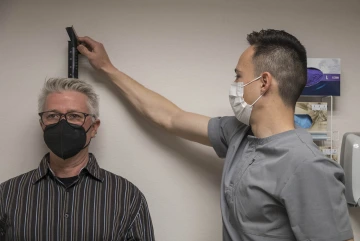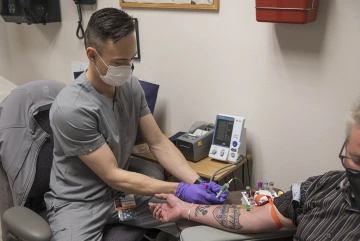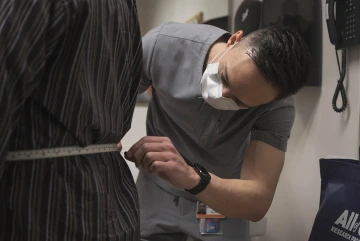Putting ‘Me’ in the All of Us Research Program
Have you ever been told you were “one in a million?” Often it has a positive connotation, as in, “You are so darn wonderful!” Other times it can mean the opposite, as in, “I would have to meet a million people to find someone as odd as you.” Well, here’s your chance – really a chance for all of us – to be one in a million in a most awesome way.

Victor Mendoza (right), a senior clinical research coordinator with the All of Us UArizona – Banner team, measures Gawain Douglas’s height as one of the many biostatistics collected for his All of Us profile.
While I was researching and conducting interviews for a story on the University of Arizona – Banner Health All of Us Research Program, I became increasingly impressed and interested in the story – which is a great place to find oneself as a writer. After I told my wife and kids about it, I told my 73-year-old mom and she said, “I’m in that research project.” As it turns out, during one of her cancer survivor follow-up appointments at the UArizona Cancer Center, she was given information about the program and promptly signed up.
“I’m here today because other people volunteered for studies that led to treatments that helped save my life,” she explained. “So maybe they can learn something from studying me that will help other people. You should do it, too.”
Sign me up!
In truth, I was already thinking about signing up, but with a nudge from mom there was no more putting it off. I signed up the next day. Not only did it seem like the right thing to do, but it would give me the experience of what it is like to commit to participating in the All of Us Research Program.
Joining the program was easy and only took about two hours. You don’t have to do it all at once either – I did it over the course of a couple of evenings from my couch with a dog on my lap. Once you create your profile, there are a series of short question-and-answer modules related to your personal information, lifestyle, family medical history and consent forms. There are several short videos to explain each module and plenty of opportunities to get more information if you like.

Victor Mendoza, (left) senior clinical research coordinator with the All of Us UArizona – Banner team, says “We provide all our participants with comprehensive results from the biospecimens we collect from them. This may include genetic panel testing, ancestry data, personal pharmacogenomics and other results acquired from research done with their samples.” Mendoza started working with the program in 2018.
There is a well-designed participant dashboard where you can see what modules you have completed and what you have left to do. You are given details about how your name and other identifying information is separated from your health data for privacy and security.
The All of Us Research Program is expected to last at least 10 years, but your personal time commitment is minimal after the initial set up. You will receive occasional follow-up questionnaires.
A key to the longevity of data collection relies on participants voluntarily agreeing to share medical records from their health care providers during the study. So, while you personally don’t have to keep updating the program with health changes over the next 10 years, data from your doctors will be flowing into the system – again, all anonymized for security.
The final step to be fully part of the program is to book an appointment to have your biostatistics taken. It would have taken about 30 minutes if I had not asked so many questions. You can expect to be weighed, measured (both height, hip and waist) and have your blood pressure checked, blood drawn and provide a urine sample.

“The most rewarding aspect of this job is knowing that we are contributing to changing the landscape of medicine from a “one-size-fits-all” approach, to one that takes individual differences into account,” says Mendoza. “We are doing this in major part by bridging the gaps of representation in clinical research.”
Throughout the process, you have choices as to what data you want to share with the program. Obviously, the more you share, the more researchers can learn from you. You can also remove yourself from the project at any time in the future.
If signing up for the good of humanity, or because my mom thinks you should, hasn’t convinced you, there is the potential for a very personal benefit to being a part of the All of Us Research Program. Your DNA is sequenced, and you can choose to receive a report back with your results for free.
This information can tell you about your family history – where your genes come from in the world – or even why you don’t like certain foods or can’t roll your tongue. From a health perspective, you can learn if you have specific genes or genetic markers that can indicate a higher risk to certain medical conditions or diseases, which could lead you and your health care provider to do further testing and keep a close watch on these risks. It could even help your medical team use precision treatments based on your genetic makeup.
One more thing to think about: If you are part of a group that is underrepresented in biomedical research – based on race, ethnicity, gender or age – this is an amazing opportunity to help researchers help people like you. One goal of the program is to make sure people who have been historically underrepresented in biomedical research are included.
So, take it from me, or better yet, take it from my mom. Seriously consider making yourself one in a million and help researchers save lives – maybe someday even yours.

